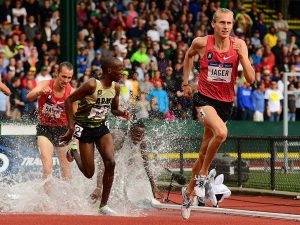Increase Athletic Flow and Resilience with Mindfulness
By John M. de Castro, Ph.D.
“Mindfulness shares similarities with flow state, and because it is based on moment-to-moment experiences, it can promote attention regulation, emotional regulation, and body awareness.” – Jian-Hong Chen
Athletic performance requires the harmony of mind and body. Excellence is in part physical and in part psychological. That is why an entire profession of Sports Psychology has developed. “In sport psychology, competitive athletes are taught psychological strategies to better cope with a number of demanding challenges related to psychological functioning.” They use a number of techniques to enhance performance including mindfulness training. It has been shown to improve attention and concentration and emotion regulation and reduces anxiety and worry and rumination, and the physiological and psychological responses to stress. As a result, mindfulness training has been employed by athletes and even by entire teams to enhance their performance.
Flow refers to a state of mind that is characterized by a complete absorption with the task at hand, often resulting in enhanced skilled performance. The flow state underlies the athletes’ feelings and thoughts when they recall the best performances of their careers. It is obvious that the notion of flow and mindfulness have great similarity. There is little known, however, about the relationship between mindfulness and flow in athletes.
In today’s Research News article “Examining the Effects of Brief Mindfulness Training on Athletes’ Flow: The Mediating Role of Resilience.” (See summary below or view the full text of the study at: https://www.ncbi.nlm.nih.gov/pmc/articles/PMC8166472/ ) Liu and colleagues recruited student athletes and randomly assigned them to receive a 30-minute audio recording with exercises about mindfulness or the news. Before and after training the students were measured for mindfulness, flow, and resilience.
They found that compared to baseline and the control group, the athletes who received the brief mindfulness instruction had significant increases in flow, resilience, and mindfulness, including the observing, describing, and nonreactivity facets of mindfulness. Further mediation analysis revealed that mindfulness affected flow directly and also indirectly by increasing resilience which in turn increased flow.
Previous research has demonstrated that mindfulness training increased resilience and flow. The present study, though, is remarkable in that such a brief (30 minute) mindfulness training produced such significant results. The study, however, is artificial as affects on actual athletic performance was not measured. It would be interesting in future studies to observe whether a brief mindfulness training would improve the students’ actual athletic performances.
So, increase athletic flow and resilience with mindfulness.
“athletes perform better when experiencing flow and that mindfulness meditation for athletes can help them experience flow.” – Ertheo
CMCS – Center for Mindfulness and Contemplative Studies
This and other Contemplative Studies posts are also available on Google+ https://plus.google.com/106784388191201299496/posts and on Twitter @MindfulResearch
Study Summary
Fengbo Liu, Zhongqiu Zhang, Shuqiang Liu, Nan Zhang. Examining the Effects of Brief Mindfulness Training on Athletes’ Flow: The Mediating Role of Resilience. Evid Based Complement Alternat Med. 2021; 2021: 6633658. Published online 2021 May 24. doi: 10.1155/2021/6633658
Abstract
Background
Flow is characterized by the strong concentration in competitions, eliminating irrelevant thoughts and emotions, integrating all tasks, and continuing the competition smoothly even in challenging situations. The present study was into whether or not brief mindfulness training can improve athletes’ flow and further explore the mediating effect of resilience in the intervention.
Methods
The 2 (experimental conditions) × 2 (time) mixed design was used in this study. Fifty-seven student-athletes were recruited and randomly assigned into either a brief mindfulness group (n = 29) or a control group (n = 28). Before and after the intervention, every participant completed a self-report measure including mindfulness, flow, and resilience.
Results
Participants in the brief mindfulness group showed increased mindfulness, flow, and resilience (p < 0.001) after brief mindfulness training; when putting resilience change (B = 0.30, 95% CI [0.031, 0.564]) into the equation, the direct (95% CI [3.156, 13.583]) and indirect (95% CI [0.470, 5.048]) effects of mindfulness training were both significant.
Conclusion
It was concluded that brief mindfulness training could significantly improve athletes’ flow and resilience, and resilience partly mediated the effects of brief mindfulness training on flow.
https://www.ncbi.nlm.nih.gov/pmc/articles/PMC8166472/
